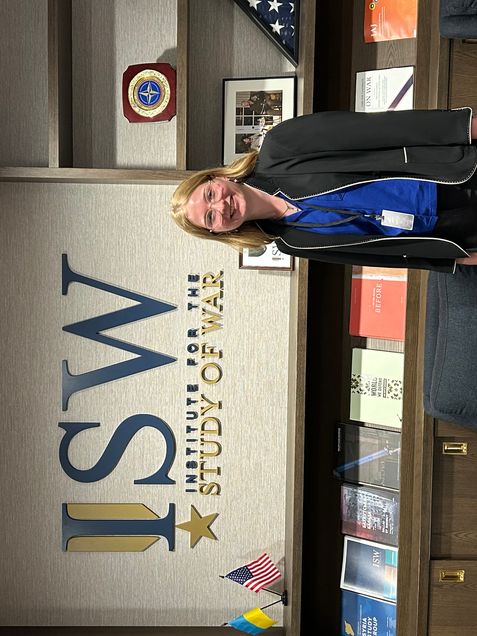KIP Student Feature – Sydney Aslan
 As a second-time KIP awardee, Sydney Aslan (CAS’26, Political Science) spent her 2024 summer in Washington D.C. interning for the Institute for the Study of War where she worked with the External Relations team around media on the Russia-Ukraine War.
As a second-time KIP awardee, Sydney Aslan (CAS’26, Political Science) spent her 2024 summer in Washington D.C. interning for the Institute for the Study of War where she worked with the External Relations team around media on the Russia-Ukraine War.
Q&A with Sydney Aslan
Could you give us a brief description of the organization you are interning with and what your primary responsibilities are during this internship?
The Institute for the Study of War (ISW) is a national security think tank located in Washington D.C. ISW uses open source intelligence to monitor world conflicts, namely the Russia-Ukraine War, the Israel-Hamas War, and events in the South China Sea. Through conducting intensive research and publishing daily assessments of conflicts, ISW is able to help provide accurate information about evolving conflicts to both the public and policymakers.
I worked on the External Relations team during my internship where I was responsible for recording how the media was talking about our assessments of various conflicts, posting on various social media accounts including Instagram, Threads, and YouTube, and developing and editing our briefing room videos with updates on the Russia-Ukraine War.
What area(s) of justice does this organization work in and how did your internship help promote/fulfill these justice goals?
ISW works to increase both the public’s and policymakers’ knowledge of world conflicts. This includes providing real-time updates to civilians in the conflict zones. They aim to spread accurate and reliable information in fast-changing situations and in the process help eliminate mis and disinformation about these conflicts. Education and aiding the public in having an accurate understanding of what happens in the world is at the basis of ensuring justice in any situation, but especially for civilians in these conflict zones.
My internship in external relations worked directly with disseminating ISW’s assessments with the public through social media and through monitoring how the media discussed us. The spread of knowledge is essential to accomplishing justice, and my communications work for this internship was at the core of that goal.
Has your work this summer changed how you think about justice issues?
My work this summer has helped me gain a greater understanding of how integral research and effective communication are to ensuring justice can be achieved for civilians in conflict zones. In a fast-changing conflict, it’s hard to get accurate information about what’s happening without that information being classified. Research through open source intelligence methods, such as mapping software and social media, can be extremely helpful and accessible to those in danger as well as others in the world who need to understand what’s happening in order to better provide aid and support.
How did you find out about this internship, and what advice would you give to students hoping to apply for this funding opportunity in the future?
I found out about this internship through researching what internships were available in national security in Washington D.C. My advice to students interested in this funding opportunity in the future is to do research on what supports are available to you. There are many programs, including KIP, that can help fund opportunities that would otherwise be unpaid. Without the funding support from KIP, I would not have been able to pursue this unpaid internship. Going into my internship search with the knowledge that I could apply for funding support for unpaid nonprofit internships helped me understand what my options were and not prematurely disqualify an internship simply because it was unpaid.
How has the Kilachand coursework and/or the KIP summer mentoring sessions helped prepare you for the work you are doing during your internship?
When working with issues in conflict zones, there will inevitably be information on people forcibly displaced from their homes as a result of the conflict. My previous experience taking KHC HC 302 on Forced Displacement helped me understand the issues these forcibly displaced people face on a much deeper level. It was fascinating and sobering to engage with these issues that I’d learned about in class in a real-world work context.
Learn more about the Kilachand Internship Program here.